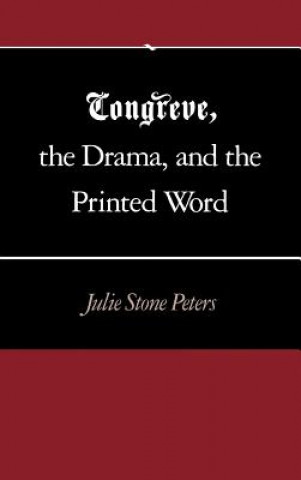
Doručení
Nákupní rádce





Nehodí se? Vůbec nevadí! U nás můžete do 30 dní vrátit
 Dárkový poukaz
V libovolné hodnotě
Dárkový poukaz
V libovolné hodnotě
S dárkovým poukazem nešlápnete vedle. Obdarovaný si za dárkový poukaz může vybrat cokoliv z naší nabídky.
Congreve, the Drama, and the Printed Word
 Angličtina
Angličtina
 230 b
230 b
30 dní na vrácení zboží
Mohlo by vás také zajímat


In the late seventeenth century, theater and print began the history of their tense relations and imperfect alliance. Plays, of course, had been printed in England for more than a century. However, it was not until the printing of fine editions of English playwrights, by Tonson and others, that it became common for dramatists to worry over the details of both performace and print and to supervise closely the publication of their own works. The theater was joining itself to the page, defining itself against the printed word. The author's focus is the most active phase of the career of William Congreve, a crucial juncture in the history of print and publishing, the two decades before the 1710 Copyright Act, when the book trade was becoming a large, intricate, and lucrative commercial business. Congreve's work in the theater began to yield to his work with the book trade (not only as playwright but also as poet, scholar, translator, and editor), culminating in the three-volume edition of his Works in 1710. As Congreve the playwright, committed to performance as a medium, begins to yield to Congreve the dramatist, committed to the page, the oral and gestural qualities of the live theater become inscribed in print-world values. The early chapters of the book trace the ways in which the published text, after the Restoration, changed the oral status of the theater: Congreve's publishers and his library began to dominate his sense of the live theater and helped to establish the status of the dramatic poet. The author explores the ways in which Congreve's notions of orality were circumscribed by a literacy increasingly identified with the print and examines the relations of print literary to notions of scholarship, satire of pedantry, the historical claims of Congreve's 'theatrical' novel Incognita, the ostensibly oral realm of the Ancients, and ideas of truth, time, and inheritance. Turning to issues of specific concern to the theater, the author investigates the ways in which print put pressure on modes of expression with particularly theatrical application, such as the visual image, gestural sign, and material object. I n the final chapter, she shows how Congreve's treatment of the dichotomy between nature and art suggests a paradigm for understanding his retreat from the stage into the library, into the private spaces of the mind.
Informace o knize
 Angličtina
Angličtina




 Jak nakupovat
Jak nakupovat






















